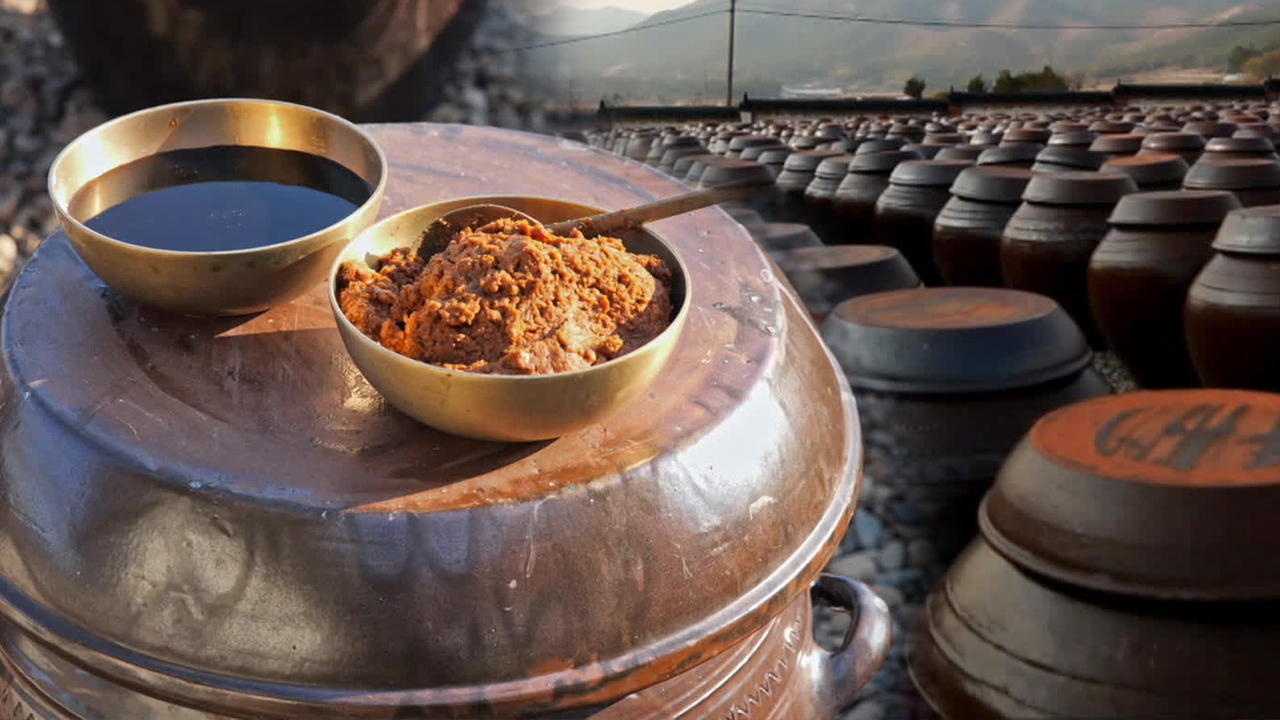Foundation of Korean cuisine ‘jang making culture’ to become UNESCO Intangible Cultural Heritage
입력 2024.11.06 (00:31)
읽어주기 기능은 크롬기반의
브라우저에서만 사용하실 수 있습니다.
[Anchor]
The 'jang making culture,' which can be considered the foundation of Korean cuisine, is expected to be registered as a UNESCO Intangible Cultural Heritage of Humanity.
Above all, it has received high praise for embodying the history and traditions of our community.
The final decision on the registration is expected to be made early next month.
Jeong Hae-joo reports.
[Report]
Under clear skies, rows of traditional fermentation jars are aligned.
Every year, monks carefully brew ganjang(soy sauce) and doenjang(soybean paste), Korea's traditional fermented sauces.
After years of waiting, the sauces develop their deep flavors.
[Buddhist Monk Gyeo-ho: "We brew on 'the day of the horse', and while brewing, we continuously chant. From the moment we dissolve the salt, we chant... It's the taste of nature. Doenjang and ganjang are not artificial."]
This 'jang making culture' has been the root of our diet since ancient times and is now gaining attention as the source of K-food.
A UNESCO evaluation body has recommended the 'Korean jang making culture' for registration as an Intangible Cultural Heritage of Humanity.
The careful selection of beans, the boiling and mashing to make meju, then hanging it with rice straw, and soaking it in saltwater for fermentation all showcase a unique Korean culture.
In particular, it has been recognized for inheriting the community spirit of families and society through the process of making jang.
[Shin Dong-hwa/Honorary Professor, Jeonbuk National University Department of Food Engineering: "Fermented sauces play the most fundamental role in differentiating Korean cuisine. As peole gather to make it together, it creates a culture of unity among the members..."]
Starting with the Jongmyo Jerye ritual, our country already has 22 elements of Intangible Cultural Heritage, and including Talchum (mask dance).
The final decision on registration will be made in early next month at the 19th Intangible Heritage Committee, and there have been very few cases where a recommendation for registration has been overturned.
This is Jeong Hae-joo from KBS News.
The 'jang making culture,' which can be considered the foundation of Korean cuisine, is expected to be registered as a UNESCO Intangible Cultural Heritage of Humanity.
Above all, it has received high praise for embodying the history and traditions of our community.
The final decision on the registration is expected to be made early next month.
Jeong Hae-joo reports.
[Report]
Under clear skies, rows of traditional fermentation jars are aligned.
Every year, monks carefully brew ganjang(soy sauce) and doenjang(soybean paste), Korea's traditional fermented sauces.
After years of waiting, the sauces develop their deep flavors.
[Buddhist Monk Gyeo-ho: "We brew on 'the day of the horse', and while brewing, we continuously chant. From the moment we dissolve the salt, we chant... It's the taste of nature. Doenjang and ganjang are not artificial."]
This 'jang making culture' has been the root of our diet since ancient times and is now gaining attention as the source of K-food.
A UNESCO evaluation body has recommended the 'Korean jang making culture' for registration as an Intangible Cultural Heritage of Humanity.
The careful selection of beans, the boiling and mashing to make meju, then hanging it with rice straw, and soaking it in saltwater for fermentation all showcase a unique Korean culture.
In particular, it has been recognized for inheriting the community spirit of families and society through the process of making jang.
[Shin Dong-hwa/Honorary Professor, Jeonbuk National University Department of Food Engineering: "Fermented sauces play the most fundamental role in differentiating Korean cuisine. As peole gather to make it together, it creates a culture of unity among the members..."]
Starting with the Jongmyo Jerye ritual, our country already has 22 elements of Intangible Cultural Heritage, and including Talchum (mask dance).
The final decision on registration will be made in early next month at the 19th Intangible Heritage Committee, and there have been very few cases where a recommendation for registration has been overturned.
This is Jeong Hae-joo from KBS News.
■ 제보하기
▷ 카카오톡 : 'KBS제보' 검색, 채널 추가
▷ 전화 : 02-781-1234, 4444
▷ 이메일 : kbs1234@kbs.co.kr
▷ 유튜브, 네이버, 카카오에서도 KBS뉴스를 구독해주세요!
- Foundation of Korean cuisine ‘jang making culture’ to become UNESCO Intangible Cultural Heritage
-
- 입력 2024-11-06 00:31:41

[Anchor]
The 'jang making culture,' which can be considered the foundation of Korean cuisine, is expected to be registered as a UNESCO Intangible Cultural Heritage of Humanity.
Above all, it has received high praise for embodying the history and traditions of our community.
The final decision on the registration is expected to be made early next month.
Jeong Hae-joo reports.
[Report]
Under clear skies, rows of traditional fermentation jars are aligned.
Every year, monks carefully brew ganjang(soy sauce) and doenjang(soybean paste), Korea's traditional fermented sauces.
After years of waiting, the sauces develop their deep flavors.
[Buddhist Monk Gyeo-ho: "We brew on 'the day of the horse', and while brewing, we continuously chant. From the moment we dissolve the salt, we chant... It's the taste of nature. Doenjang and ganjang are not artificial."]
This 'jang making culture' has been the root of our diet since ancient times and is now gaining attention as the source of K-food.
A UNESCO evaluation body has recommended the 'Korean jang making culture' for registration as an Intangible Cultural Heritage of Humanity.
The careful selection of beans, the boiling and mashing to make meju, then hanging it with rice straw, and soaking it in saltwater for fermentation all showcase a unique Korean culture.
In particular, it has been recognized for inheriting the community spirit of families and society through the process of making jang.
[Shin Dong-hwa/Honorary Professor, Jeonbuk National University Department of Food Engineering: "Fermented sauces play the most fundamental role in differentiating Korean cuisine. As peole gather to make it together, it creates a culture of unity among the members..."]
Starting with the Jongmyo Jerye ritual, our country already has 22 elements of Intangible Cultural Heritage, and including Talchum (mask dance).
The final decision on registration will be made in early next month at the 19th Intangible Heritage Committee, and there have been very few cases where a recommendation for registration has been overturned.
This is Jeong Hae-joo from KBS News.
The 'jang making culture,' which can be considered the foundation of Korean cuisine, is expected to be registered as a UNESCO Intangible Cultural Heritage of Humanity.
Above all, it has received high praise for embodying the history and traditions of our community.
The final decision on the registration is expected to be made early next month.
Jeong Hae-joo reports.
[Report]
Under clear skies, rows of traditional fermentation jars are aligned.
Every year, monks carefully brew ganjang(soy sauce) and doenjang(soybean paste), Korea's traditional fermented sauces.
After years of waiting, the sauces develop their deep flavors.
[Buddhist Monk Gyeo-ho: "We brew on 'the day of the horse', and while brewing, we continuously chant. From the moment we dissolve the salt, we chant... It's the taste of nature. Doenjang and ganjang are not artificial."]
This 'jang making culture' has been the root of our diet since ancient times and is now gaining attention as the source of K-food.
A UNESCO evaluation body has recommended the 'Korean jang making culture' for registration as an Intangible Cultural Heritage of Humanity.
The careful selection of beans, the boiling and mashing to make meju, then hanging it with rice straw, and soaking it in saltwater for fermentation all showcase a unique Korean culture.
In particular, it has been recognized for inheriting the community spirit of families and society through the process of making jang.
[Shin Dong-hwa/Honorary Professor, Jeonbuk National University Department of Food Engineering: "Fermented sauces play the most fundamental role in differentiating Korean cuisine. As peole gather to make it together, it creates a culture of unity among the members..."]
Starting with the Jongmyo Jerye ritual, our country already has 22 elements of Intangible Cultural Heritage, and including Talchum (mask dance).
The final decision on registration will be made in early next month at the 19th Intangible Heritage Committee, and there have been very few cases where a recommendation for registration has been overturned.
This is Jeong Hae-joo from KBS News.
-
-

정해주 기자 seyo@kbs.co.kr
정해주 기자의 기사 모음
-
이 기사가 좋으셨다면
-
좋아요
0
-
응원해요
0
-
후속 원해요
0















이 기사에 대한 의견을 남겨주세요.